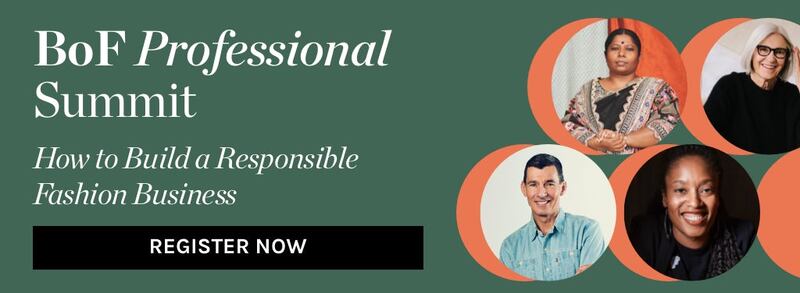
The Business of Fashion
Agenda-setting intelligence, analysis and advice for the global fashion community.

Agenda-setting intelligence, analysis and advice for the global fashion community.


Join us on June 17 for a half-day of online events exploring fashion’s responsibility to people and the planet as the world grapples with a climate emergency, racial injustices and a once-in-a-lifetime economic and public health crisis. Space is limited. Register now to reserve your spot.
NEW YORK, United States — Over the past few years, fashion companies have shifted from championing apolitical causes like ending hunger to engaging with more divisive issues, from climate change to racism.
Now, between an unprecedented pandemic and the biggest wave of mass demonstrations in the US in decades, they’re discovering just what sort of bargain they’ve struck with their customers.
Early last week, corporate social media accounts were filled with supportive messages for the protestors, much like they were during the Australian wildfires and at the start of the pandemic. Only this time, the intended targets of that support pushed back.
ADVERTISEMENT
L’Oreal Paris’ “speaking out is worth it” post, which included an unspecified “commitment” to the NAACP, prompted model Munroe Bergdorf to recount how the brand had cancelled her contract in 2017 after she spoke out against racism following a neo-Nazi rally.
On May 31, the clothing brand Reformation posted that it would donate an unspecified amount to various organisations, and used the Black Lives Matter hashtag. Comments on the post accused the brand of performative activism. Former employee Elle Santiago, who is black, detailed her experiences with racism within the company and called on Chief Executive Yael Aflalo to step down.
Aflalo apologised in an Instagram post captioned "I've failed," and announced a diversity and inclusion board, a personal donation of $500,000 and an independent investigation into the company's workplace culture.
What changed? Some consumers, trained to expect brands to share their values on everything from sustainability to workers’ rights to racial justice, have started probing whether that solidarity applies to how the companies operate. Often, they find the views expressed on Instagram don’t match the reality inside stores, factories and offices.
“People are looking at companies almost as they would look at individuals to be contributors to a better world,” said Enshalla Anderson, chief strategy officer of FutureBrand North America.
Big companies are powerful, they shape politics in the US.
But corporate activism was always going to be an awkward fit for companies that are mainly in the business of selling clothes, shoes and cosmetics, and rarely do they offer a solution beyond their product offering. Activists are pushing a new standard for how brands approach social issues, advocating that a company’s public-facing messaging has to reflect its internal culture.
Examples include designer Aurora James’ 15 percent pledge, where retailers dedicated shelf space to black-owned businesses. Pull Up for Change asks followers not to buy products from companies unless they disclose how many black employees they employ. Sunday Riley, Ulta, Glossier and others have shared their numbers, and stated they are working to do better.
Nike won plaudits last week for pledging $40 million to help the black community. Its Jordan brand, along with Michael Jordan, donated an additional $100 million. Glossier donated $1 million to various organisations promoting racial justice and black-owned beauty brands.
ADVERTISEMENT
In the past, companies saw such demands — or speaking out on controversial topics at all — as antithetical to running a business. Increasingly, the opposite is true.
"It's not that they just sell shoes," said Tulin Erdem, marketing professor at New York University's Stern School of Business. "Big companies are powerful, they shape politics in the US...they [the younger generation] want them to do something."
Consumers looking for moral leadership or a larger set of responsibilities from fashion brands is relatively new. Erdem points to the rise of commercial influence in personal life and younger generations’ growing sense that the current economic system doesn’t hold their interests. As younger generations lose faith in the power of larger social and political institutions, companies are filling the void.
It’s a progressive echo of the corporate activism of the 1970s, when energy and telecommunications firms stepped up their use of marketing campaigns to advocate their interests, said Peggy Simcic Brønn, a professor emeritus of communication and culture at the Norwegian Business School in Oslo who studies social responsibility marketing.
“[Companies] were trying to get the public to believe that they could regulate themselves; that the government didn’t need to do this, and they could create their own good in working environments,” she said.
That sort of marketing hasn’t gone away, though in recent decades, brands have begun embracing causes that at first glance have little to do with their own balance sheets. The ice cream maker Ben & Jerry’s, for instance, went on a nationwide campaign in 2004 against the George W. Bush administration.
Direct-to-consumer start-ups have taken activism a step further. Allbirds, Reformation and Everlane found success by portraying themselves as aligned with the values of their consumers and employees, from creating spaces for women to sustainable manufacturing.
Some see this as just another marketing tactic.
ADVERTISEMENT
“I think very few brands are actually listening to consumers right now. They’re just doing what they have to do,” said Brian Salzman, founder and chief executive of marketing agency RQ. “But are they making a commitment? The word authentic is so overused and pathetic but it’s so important.”
Others see an evolution toward “stakeholder capitalism,” where companies factor customers, suppliers, employees and local communities into their business models, rather than focusing solely on maximising profits for shareholders.
The pandemic and the protests have raised questions about whether that dual mission is even possible.
Brands that have embraced a wider set of values find it has made them vulnerable to criticism if consumers find they come up short. Everlane’s mission of radical transparency was undermined after it was accused of retaliating against employees attempting to unionise; The Wing’s brand of feminism took a hit when employees accused the women’s club of harmful work practises, particularly towards employees of colour.
The bonds between consumers, employees and companies has never been more tenuous, especially for companies that target younger customers, who are likely to see their spending power reduced over the next few years as a global recession takes hold.
It's always been a dangerous kind of branding.
“It doesn’t take a whole lot of research for us to look up these brands and see what they’re really about,” said Kimberly Jenkins, assistant professor of Fashion Studies at Ryerson University. “You can tell a lot by looking up leaders on their Instagram accounts and social media and see their lifestyles. What kind of political messages do they tend to circulate? Are they doing this work 365 days a year?”
Companies should be open and honest about missteps and shortcomings before entering larger discussions surrounding social and political issues.
“Just be honest and say ‘Look, we’re figuring this out with you or we’ve committed to this but we don’t know what that looks like now,’” said Salzman.
Some, Erdem argues, may be better off avoiding statements or social media posts entirely until making larger internal efforts that consumers can see for themselves.
In a recession, many brands are hoping that the pledges and commitments they’ve made will secure consumer confidence, and spending in the future. If they don’t get it right, consumers will redirect their dollars elsewhere.
“It’s always been a dangerous kind of branding. It’s just taken on a whole new life in the last couple of years,” said Brønn. “If you’re not perceived as being authentic it will come back and bite you in the ass.”
Related Articles:
[ Will Fashion Ever Be Good for the World? Its Future May Depend on It.Opens in new window ]
Often left out of the picture in a youth-obsessed industry, selling to Gen-X and Baby Boomer shoppers is more important than ever as their economic power grows.
This month, BoF Careers provides essential sector insights to help PR & communications professionals decode fashion’s creative landscape.
The brand’s scaled-back Revolve Festival points to a new direction in its signature influencer marketing approach.
Brands selling synthetic stones should make their provenance clear in marketing, according to the UK’s Advertising Standards Authority.